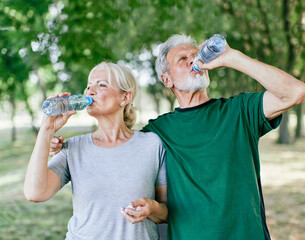Findings from the National Institutes of Health suggest that people who don’t drink enough fluids could face a higher risk of disease, but some researchers aren’t convinced.

A study from the NIH finds that adults who stay well-hydrated develop fewer chronic conditions, such as heart and lung disease, and live longer overall than those who don’t drink enough fluids.
Adults who aren’t sufficiently hydrated may age faster, face a higher risk of chronic diseases and be more likely to die younger than those who stay well-hydrated, according to a new study from the National Institutes of Health.
The results are based on data collected over 25 years from more than 11,000 adults in the U.S. The participants attended their first medical visits at ages 45 to 66, then returned for follow-ups through at ages 70 to 90.
Just as regular physical activity and proper nutrition are considered part of a healthy lifestyle, she said, “emerging evidence from our and other studies indicate that adding consistent good hydration to these healthy lifestyle choices may slow down the aging process even more.”
Dehydration isn’t a common problem, staying hydrated does have known health benefits. It can help people ward off joint pain and maintain normal body temperature, and it can prevent constipation or kidney stones, according to the Centers for Disease Control and Prevention.

Asher Rosinger, the director of the Water, Health and Nutrition Lab at Penn State College of Health and Human Development, said it’s more likely that chronic dehydration speeds the aging process than that good hydration could help slow it down.
Proper hydration “will ensure kidneys work properly and extra stress isn’t placed on the body physiologically,” he said in an email.
If a person isn’t drinking enough water and consumes sugar-sweetened beverages instead, Rosinger added, the risk of cognitive issues, urinary tract infections, kidney stones and kidney injury goes up.
The National Academies of Medicine recommends six to nine 8-ounce cups of fluid per day for women and eight to 12 for men. Dmitrieva said those recommendations are ideal for an average person, and Rosner also found the guidelines reasonable. But both experts noted that people have different hydration needs based on their activity levels and the environment outside.
Appel, meanwhile, said the traditional recommendation to drink about eight glasses of water a day is “really not based on any scientific evidence.” His research has found that people’s normal drinking behavior usually leads to adequate hydration. As Rosner put it, “water is simply the best, but other beverages are fine in moderation.”
Read the complete article here: https://www.ncoa.org/article/how-to-stay-hydrated-for-better-health
Contact us for more information about the Whole House Water Filtration System.
+-

![3670104[1]](https://superiorwater.com/wp-content/uploads/2021/03/36701041-150x150.png)
![WQA[1]](https://superiorwater.com/wp-content/uploads/2021/03/WQA1.png)
![bbb-accredited-business-symbol-png-logo-17[1]](https://superiorwater.com/wp-content/uploads/2021/03/bbb-accredited-business-symbol-png-logo-171.png)
![800px-Flag_of_the_United_States[1]](https://superiorwater.com/wp-content/uploads/2021/03/800px-Flag_of_the_United_States1.png)